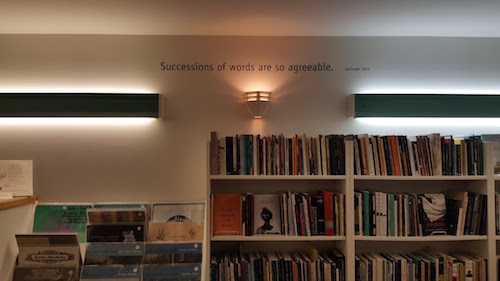The readings that helped make Open Books

As Open Books owner John Marshall prepares his poetry bookstore for a new owner and a new future, he can’t help but reflect on the past. Between the old friends sending their best wishes on news of Marshall’s retirement and the prospect of retirement, he describes himself as feeling a little “sentimental.”
“I’m getting lovely memories,” Marshall says. In particular, he’s been remembering some of the liveliest events Open Books has hosted over the last two decades. “Ben Lerner’s first reading in Seattle was here and it was just brilliant,” re recalls. After that event, Marshall says, Seattle poet Molly Tenenbaum walked up to Marshall and identified Lerner’s event as one of those rare readings where one day she’ll look back and “say, ‘I was there.’”
Talking about one reading opens a floodgate of memories: When Mary Ruefle first read at Open Books, Marshall says she didn’t want an introduction, and she wanted the store lights off during the reading. National Book Award-winning poet Nikky Finney “read here twice and was devastating both times.”
“Sherman Alexie’s first or second reading in Seattle was at our old site,” Marshall says, “and he paced and was angry — doing less standup and more snarl. And that was among the best readings I’ve ever seen.” He says Alexie demonstrated “a certain star quality” from the very beginning, a sense that he was bound for big things.
Some of Marshall’s favorite Open Books moments aren’t even readings. “Gwendolyn Brooks came in here and we met her and she wrote in books that we own,” he says, his voice filled with wonder. Then he points over to the middle of the store. “John Ashbery sat on those benches,” he says. “I held Seamus Heaney’s gold card in my hand! We told him he didn’t have to buy anything, and he insisted.”
Since it looks — knock wood — as though Open Books will have a life after Marshall, what kind of advice does he have for the next owners? What makes a good poetry event? Obviously, “a good writer who can read well,” he says, one who “doesn’t explain too much between poems.” What else? “An attentive audience who’s there to listen to poetry. A curt and intelligent introduction — with an emphasis on intelligence, because curt is not enough. I’ve seen some people just read the back of the book” as an introduction, Marshall says, and that’s always a disappointing start to a reading.
It’s telling that Marshall’s favorite moments at Open Books involve the presence of authors. A bookstore with a reading is a bookstore that is full of people. The words pace the room and fill the space, are applauded, are celebrated. Poetry collections, more than other kinds of books, come alive when the author is near. They’re such personal objects, so full of the author’s own voice, that something special is sure to happen when book and author come together to share the same space.